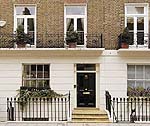Lodger numbers rise
There has been a rise in the number of property owners taking in lodgers


It appears that more of Britain’s homeowners are keen to follow in the footsteps of Rupert Rigsby, the seamy but loveable landlord from Eighties’ TV comedy Rising Damp, and take in lodgers. Eager to beat the recession, 27,000 more landowners took in lodgers over the last 12 months, up 8.3%, to rake in £2.3 billion. According to a new study from flatshare site SpareRoom.co.uk, by the beginning of September, the number of UK live-in landlords had swelled from 324,000 to 351,000, while the lodger population climbed from 452,000 to 477,000. This year, homeowners will earn £2.3 billion in rentals income from letting out their spare rooms, an increase of £162 million compared to last year. The average rent paid by a typical lodger is £93.60 a week, equivalent to £406 a month, 6.1% higher than a year ago, just outpacing inflation. This translates to a single lodger paying enough to cover more than half the monthly payments on a £120,000 mortgage. Many landlords have more than one lodger (the average is a.3), bringing the average annual income to £6,617. ‘Tenant demand is booming as tens of thousands delay buying their first home and immigration continues to rise. It’s a really good option for short-term renters and they are providing a lifeline to homeowners,’ says Matt Hutchinson, director research at SpareRoom.co.uk. Just over 70% of live-in landlords are single. Without a partner to share the huge jumps in mortgage payments and other living expenses, and to provide a cushion in the event of unemployment, taking in a lodger is an obvious way to survive the looming recession.’ As incomes are squeezed across the UK, the phenomenon of spare room renting is going beyond the limits of Britain’s big cities. The fastest growth in demand for lodgers was in the north west and west Midlands, with Carlisle, Stoke on Trent, Walsall and Wigan topping the table. Many towns in the south west, traditionally less likely to take in lodgers, also are witnessing strong demand. London, Glasgow and Edinburgh have seen the slowest demand. ‘In big cities, high house prices and a high cost of living drive demand for lodgers, while a shortage of housing and a large population of young incomers typically drive the number looking for a home. ‘But the sharp downturn in the economy is now making this a national phenomenon. More people would already be behind with their mortgage payments if they had not capitalised on the earning power of their spare room,’ adds Mr Hutchinson.
Exquisite houses, the beauty of Nature, and how to get the most from your life, straight to your inbox.
Country Life is unlike any other magazine: the only glossy weekly on the newsstand and the only magazine that has been guest-edited by His Majesty The King not once, but twice. It is a celebration of modern rural life and all its diverse joys and pleasures — that was first published in Queen Victoria's Diamond Jubilee year. Our eclectic mixture of witty and informative content — from the most up-to-date property news and commentary and a coveted glimpse inside some of the UK's best houses and gardens, to gardening, the arts and interior design, written by experts in their field — still cannot be found in print or online, anywhere else.
